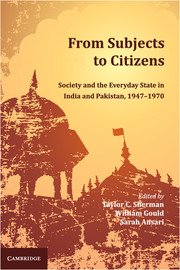Book contents
- Frontmatter
- Contents
- Acknowledgements
- Introduction
- 1 Personal Law and Citizenship in India's Transition to Independence
- 2 From Subjects to Citizens? Rationing, Refugees and the Publicity of Corruption over Independece in UP
- 3 Performing Peace: Gandhi's Assassination as a Critical Moment in the Consolidation of the Nehruvian State
- 4 Migration, Citizenship and Belonging in Hyderabad (Deccan), 1946–1956
- 5 Punjabi Refugees' Rehabilitation and the Indian State: Discourses, Denials and Dissonances
- 6 Sovereignty, Governmentality and Development in Ayub's Pakistan: The Case of Korangi Township
- 7 Everyday Expectations of the State during Pakistan's Early Years: Letters to the Editor, Dawn (Karachi), 1950–1953
- 8 Concrete ‘Progress’: Irrigation, Development and Modernity in Mid-Twentieth Century Sind
- 9 Partition Narratives: Displaced Trauma and Culpability among British Civil Servants in 1940s Punjab
- Contributors
- Index
5 - Punjabi Refugees' Rehabilitation and the Indian State: Discourses, Denials and Dissonances
Published online by Cambridge University Press: 05 February 2014
- Frontmatter
- Contents
- Acknowledgements
- Introduction
- 1 Personal Law and Citizenship in India's Transition to Independence
- 2 From Subjects to Citizens? Rationing, Refugees and the Publicity of Corruption over Independece in UP
- 3 Performing Peace: Gandhi's Assassination as a Critical Moment in the Consolidation of the Nehruvian State
- 4 Migration, Citizenship and Belonging in Hyderabad (Deccan), 1946–1956
- 5 Punjabi Refugees' Rehabilitation and the Indian State: Discourses, Denials and Dissonances
- 6 Sovereignty, Governmentality and Development in Ayub's Pakistan: The Case of Korangi Township
- 7 Everyday Expectations of the State during Pakistan's Early Years: Letters to the Editor, Dawn (Karachi), 1950–1953
- 8 Concrete ‘Progress’: Irrigation, Development and Modernity in Mid-Twentieth Century Sind
- 9 Partition Narratives: Displaced Trauma and Culpability among British Civil Servants in 1940s Punjab
- Contributors
- Index
Summary
Introduction
This is the story of a Ministry of the Government of India. A dull, uninspiring theme, you will exclaim. But it is a richly evocative saga. Here are drama and passion, illimitable human suffering, heroic endeavour. Within the confines of what a Ministry set out to do and what it accomplished, you find every element of a Greek tragedy. Only everything is multiplied a thousand fold. You have men whose reason is overthrown; men plunged into the depths of anguish. Impenetrable gloom shrouds the story of their purgatory. But, as in ancient legends, there is expiation and the slow return to blessedness. These then are the ingredients of our chronicle.
The above quotation commences the official account of the Indian state's response to the influx of millions of refugees from Pakistan at independence. This narrative was published in 1967, two years after the formal winding-up of the Ministry of Relief and Rehabilitation. The 230-page volume was published to provide the definitive account of the story of rehabilitation. While the purple prose of the prelude is not sustained throughout the publication, the themes of tragedy, loss, redemption and restoration are recurring. This chapter reveals how the particular experiences of mass migration in the Punjab were universalized in The Story of Rehabilitation and earlier official accounts. It argues that the Indian state sought legitimization through a master narrative of its successful handling of the Punjab's refugee crisis.
- Type
- Chapter
- Information
- From Subjects to CitizensSociety and the Everyday State in India and Pakistan, 1947–1970, pp. 119 - 142Publisher: Cambridge University PressPrint publication year: 2014

